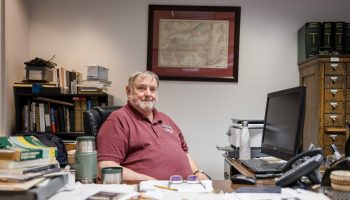Von Smith
Staff Writer

American Compass founder Oren Cass is set to close the Week Five Chautauqua Lecture Series “Innovation in Capitalism: How to Meet 21st-Century Challenges?” with his lecture on rebuilding American capitalism through investing in our domestic markets.
During his morning lecture at 10:45 a.m. today in the Amphitheater, Cass will discuss how he believes America can adapt capitalism in an increasingly globalized economy — while neither condemning capitalism nor advocating for a completely free market.
The Boston native studied law at Harvard University where he simultaneously served as the domestic policy director for Mitt Romney’s 2012 presidential campaign. He then joined the Manhattan Institute in 2015 as a senior fellow and edited their popular “Issues 2016” and “Issues 2020” series and has testified before seven congressional committees during his time there.
In 2020, Cass founded the Washington, D.C.-based conservative think tank American Compass, where he serves as a chief economist. As of July 2024, American Compass served as an adviser to Project 2025, a political initiative championed by the Republican party during the 2024 Election, where they contributed to the project’s section on the Department of Labor and Related Agencies.
Much of Cass’ work is focused on the idea of the “New Conservative,” and his founding of American Compass was fueled by the question, “What is the post-Trump right-of-center going to be?” His latest book The New Conservatives: Restoring America’s Commitment to Family, Community, and Industry explores new routes in conservatism through essays written by Cass and other American Compass intellectuals.
“Something has clearly gone very wrong with American capitalism,” Cass said. “You see that in the micro-level, in terms of wage stagnation and young men earning less now than 50 years ago, and then you see that also at the macro-level. Many of the key indicators you look at are just going in the wrong direction.”
Because of the globalization of the economy, capitalism isn’t guided by the “Invisible Hand” that people point to from Adam Smith’s The Wealth of Nations.
“Capitalism isn’t actually at fault here,” Cass said. “It can work well, or it can not work well, and that’s going to depend on the conditions in which it operates.”
Cass argues that policymakers have lost sight of the fact that the market does not act automatically.
“I think it’s actually a very unfortunate metaphor because it sounds kind of magical,” Cass said. “He only used the term ‘Invisible Hand’ once in the whole two volumes of The Wealth of Nations.”
Smith had assumed people would prefer to invest in the domestic market, rather than investing overseas. However, Cass has noted that for the last several decades American corporations and policymakers have increasingly outsourced American trade and labor in search of higher profit margins.
“If you have a situation where the things that are most attractive for private profit are also things that are socially valuable, then you can count on people pursuing their own interest to advance the public interest,” Cass said. “But, what we have seen happening through history is people finding lots of ways to pursue profit that doesn’t advance the public’s interest.”
According to Cass, the best way to build profit in America at the beginning of the 20th century was to invest in domestic manufacturing, and by the turn of the 21st century, the best way was to send manufacturing to cheaper labor overseas.
“We have gotten ourselves into a situation where the things that are most profitable are not things that create good jobs or strong industries or support strong families,” Cass said.
Cass believes rethinking financial markets and globalization is the key to prioritizing the domestic market and bringing American capitalism back to its best form.
“All of those things are the macro-adjustments you need to do in order to create the right incentives, and there’s a bunch of things on the micro-side in terms of how the organized labor and the education system works so that we are actually supporting people to succeed within the market,” Cass said.
Cass believes American political parties have approached the economy ineffectively, with conservatives believing free markets can operate automatically and liberals condemning capitalism entirely.
“Blind faith in markets is dangerous because it has led us to pursue a set of policies where we just trusted we would get good outcomes, even though there was no data to back this up,” Cass said.




